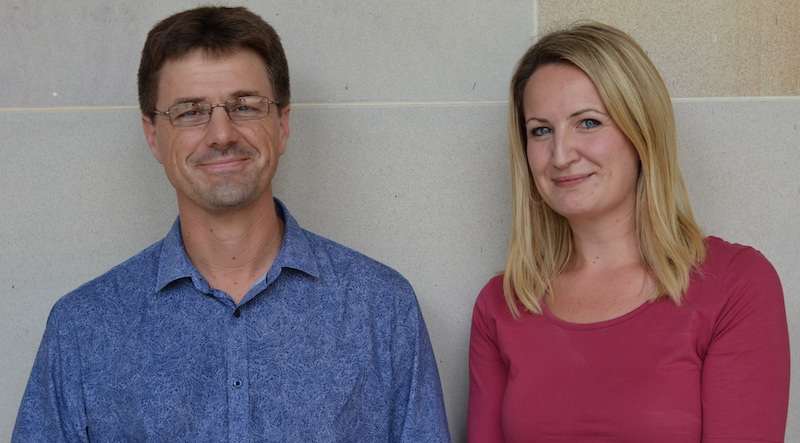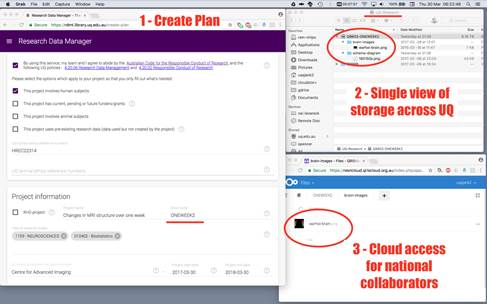
Testing of a new, world-leading system in collaborative research data management infrastructure has begun at UQ.
The UQ Research Data Manager has been built to be researcher-centric and user friendly. Early feedback from researchers indicates they are pleased with the system’s data sharing capacity and level of control they have over access to their research data with minimum administrative burden.
A project team called Integrated Data Management Planning (iDMP), instigated by UQ’s Deputy Vice-Chancellor (Research), developed the new system with a contemporary approach to research data management. Researchers from across UQ began pilot testing the UQ Research Data Manager last month.
UQ Research Data Manager is an advanced Data Management Planning (DMP) tool with a difference. The DMPs in the new system are truly active and are referred to more appropriately as Data Management Records (DMR). They are the means by which a researcher actively manages data storage allocations for their research projects, and controls access to the research data, whilst the system collects relevant, critical metadata. DMRs stay linked to the related research data throughout the entire data life cycle from conception to the final publications and research outputs. Through this working DMR the researcher manages their data storage and engages with other university systems.
Data storage is allocated automatically from cloud computing platform QRIScloud upon completion of a record in the Research Data Manager and made available across UQ’s St Lucia Campus via the MeDiCi fabric, RCC’s high performance data storage fabric.
From a user perspective, project based shares can be directly mounted on Windows, Mac and Linux on campus, as well as QRIScloud; high performance computers Tinaroo, Euramoo and FlashLite; and a host of scientific instruments, such as microscopes and gene sequencers.
The new system offers unique capabilities to expose data from QRIScloud to computers as direct high performance shares or via QRIScloud’s Nextcloud-based synch and share service. For researchers, this means ultra-fast multi-site data access on demand. It provides seamless access to data, regardless of where it is created, manipulated and archived, allowing data currently being used by researchers to be cached on campus, whereas data that has not been accessed for a time migrates back to the Polaris Data Centre in Springfield, about 30kms south of St Lucia.
Significantly, by providing a number of ways for users to access their data, the system will be an enabler of collaborative research. Data storage allocated via the system is both mounted directly on computers on the UQ network, and accessible outside of UQ via Nextcloud. This enables UQ researchers to provide access to particular data records to non-UQ collaborators, who gain access via an AAF login process. In the near future, an object store interface will also allow files to be shared globally using industry standard Web protocols.
UQ iDMP Project Manager Helen Morgan said: “UQ’s highest impact research predominately arises from collaborations, so supporting such research is a priority.”
Dr Andrew Janke, iDMP Technical Lead and Senior Research Fellow with the Centre for Advanced Imaging, said the Research Data Manager would curate data at the project level through active data management records. “This is very progressive, novel infrastructure and should lead to many benefits for the researcher and the institution. The new system will place UQ as a world leader in collaborative research data management infrastructure," he said.
By the end of this year, the combined iDMP projects should result in research data management infrastructure that supports all researchers to efficiently and securely store and access research data.
“UQ’s best researchers will be able to work collaboratively with their national and international collaborators more effectively during their projects, and archive data easily at the end of projects,” said Ms Morgan.
RCC Director Prof. David Abramson said iDMP is a “terrific example” of how multiple organisational units within UQ can work together. “We are drawing on skills in RCC, Library, ITS and multiple faculties and institutes, to achieve a solution for all researchers,” he said.
Anyone keen to participate in the pilot and try the new Research Data Manager system, please contact researchdata@uq.edu.au.




